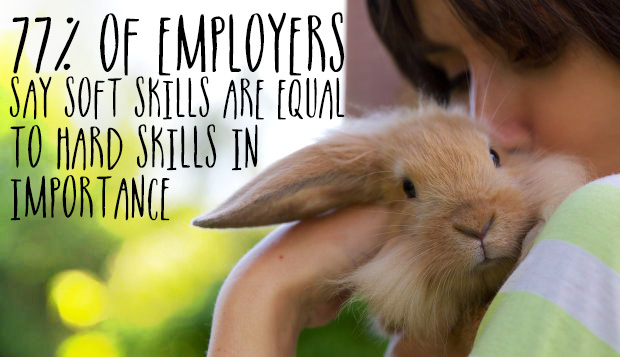I pay close attention to transferable skills when assessing employability, especially those skills we have come to call “soft”. Soft skills refer to interpersonal abilities that enhance an individual’s interactions with others, career prospects and performance on the job.
Soft skills are comprised of personality attributes or habits (no not rabbits >-=], social graces, communication, language style, interpersonal skills, managing others, leadership ability, self-motivation, time management etc., and the rules change depending on the culture of where you work and the people you work with. It’s because soft skills characterize personal relationships with other people.
Rules Change, Which is a Good Thing!
In contrast, “hard” skills (the ability to perform specific tasks or functions with technical components, like using math or software programs, typing, operating specific machines and tools, driving truck, compiling research, data entry, measuring, calculating and recording; editing and writing, etc.) that tap into left brain functioning where the rules for performance stay the same regardless of where you work
To me, what is most valuable about a soft skill is that it brings value to any job/career. Although soft skills maybe can be “mastered” new situations or people will also test them (and push you to learn more about yourself.)

Mollie is not a “dumb bunny”. Her intelligence surprises me. And her personality makes her so lovable (rabbits are good office mates, and she lets me know when she is in need of something……she’ll bump into my ankles under my desk….treat please!)
Soft Skills Puzzle
| Scrambled Words | Answer Pattern | Clues |
|---|---|---|
| nilinbaegt | ___ ___ ___ ___ ___ ___ ___ ___ ___ ___ | not made of physical substance |
| hetics | ___ ___ ___ ___ ___ ___ | rules of behavior |
| lcpanutu | ___ ___ ___ ___ ___ ___ ___ ___ | on time |
| jaequnsesoi | ___ ___ ___ ___ ___ ___ ___ ___ ___ ___ ___ | “I know not what.” |
| hdadlveeele | ___ ___ ___ ___ ___ ___ ___ ___ ___ ___ ___ | cool under pressure |
| aobitnim | ___ ___ ___ ___ ___ ___ ___ ___ | a desire to be successful |
| vmietiepcot | ___ ___ ___ ___ ___ ___ ___ ___ ___ ___ ___ | able to compete |
| lixbeefl | ___ ___ ___ ___ ___ ___ ___ ___ | adaptable |
Did you solve them all?
Soft skills are not as easily measurable as hard skills because they are less tangible. Perhaps the best way for me to measure or assess soft skills is to ask two or three people who have a good understanding of the evaluee’s work performance and personality to subjectively assess the person; then have the person do a self-assessment on the same set of skills; then evaluate how the information from the assessments coincide / match.
You can use Mind tool http://www.mindtools.com/pages/article/get-started.htm to help.
It is also to your advantage to understand which skill set your career relies on to be successful. For example, there are jobs / careers that need:
- Specific technical/hard skills and little soft skills (where you don’t necessarily have to work well with others). Examples include: physicist, chemist, scientist, production machine operator, assembly line worker, cook, carpenter, electrician, computer programmer, etc…
- Both hard and soft skills (where you need to use the rules of your learned skills and also depend on cooperating, selling or collaborating with others.) Examples include: accountant, lawyer, teacher, counselor, coach, truck driver, dispatcher, cashier, administrative assistant, etc…
- Mostly soft skills and little hard skills (where your work is more dependent on “reading” others). Examples include: sales ~ the person needs to know more than the average consumer, but really needs to know how to communicate, persuade and close a deal. Other examples include security officer, food server, host, merchandiser, etc…
I’ll add to the etc… listing of workers as I think of them! : )
Be a smart rabbit, use your soft skills to your advantage!
(Source: A national survey conducted online by Harris Poll on behalf of CareerBuilder from February 10 to March 4, 2014 that included a representative sample of 2,138 hiring managers and human resource professionals across industries and company sizes.)
In general, soft skills are more important in most business careers than hard skills. Click here for a blog containing a soft skills matrix. Employers like outgoing, friendly, and cooperative employees. To many employers, this is more important than any other qualification. In addition, because most employers look for a person who can “break the ice” at the workplace and bring valuable dynamics to their business without causing conflict, soft skills are key to being successful at work.
Rabbits have fine-tuned senses that make these small mammals some of nature’s most excellent survivors!
Keep in mind, if you don’t feel you have the soft skills you’d like, they are somewhat teachable. Here’s an idea that will help you to do so https://academy.justjobs.com/improve-your-people-skills-and-emotional-intelligence/
Let me know how I can help. My vocational counseling services are available!
__________________
My professional rehabilitation counseling practice is focused on helping people participate in the world around them, particularly in their own world of work
